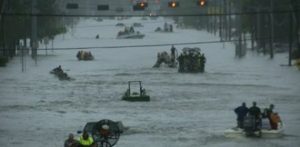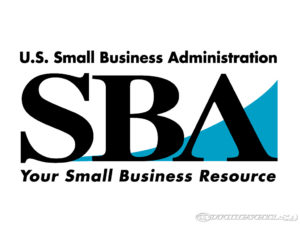 Although we’ve never met in person, I first saw David Lewis on my Facebook feed August 27th, kayaking my friend’s kids over to her, reuniting mother and children during a lull in the Hurricane Harvey rains.
Although we’ve never met in person, I first saw David Lewis on my Facebook feed August 27th, kayaking my friend’s kids over to her, reuniting mother and children during a lull in the Hurricane Harvey rains.
In the week after the rains ended, like many in his Houston neighborhood of Meyerland, Lewis ripped out his house’s flooring, countertops, all of his appliances and the bottom 4 feet of drywall, dumping them to the curb. He’s managed to repair to working order one of his three flooded cars. 21 inches of water in the first floor of his house wrecked a lot.
As with many South Texas families with lives uprooted by one of the worst storms to ever hit the continental United States, there’s a lot involved in the Lewis’ trying to put their lives back on track. He and his wife and three children currently live behind a friend’s house, in an office space converted to a temporary apartment. To regain normalcy, time is of the essence. And money too.
Lewis considers himself very lucky, in that he had flood insurance for his house, he’s still got a job, and his employer has been very flexible. Still, they need a lot, and Lewis is in the process of applying for a Small Business Association (SBA) emergency loan.
During normal times, the SBA supports business lending, working to subsidize the risks that private banks take when loaning to business customers.
These, obviously, are not normal times in post-Harvey Texas. Right now, the SBA is in a huge rush to lend as quickly as possible to not just businesses, but households too, for both housing and personal property losses. Also, the SBA is acting directly as a lender, not working through private banks. This brings some extraordinary advantages for people like Lewis affected by the storm, such as speed, lending criteria, funds availability, and extremely attractive terms for those who qualify.
Gary Colton, Public Information Officer for the SBA Office of Disaster Assistance, deployed to Houston on August 31st. Colton works for the team within the SBA that specifically responds to disasters. That’s when the SBA transforms itself from the mild-mannered Clark Kent-looking department of business lending into the federal government’s super-powered primary lender to disaster area businesses and households. Colton says “we are the primary source of funds for recovery” and that they are looking for people to apply who say “I need help to recover.”
People like David Lewis.
Lewis is eager to rebuild his house. But there’s no point rebuilding and repairing if the reconstruction doesn’t lift his house about 6 feet above the ground. He’s lucky to have had flood insurance, and possibly will qualify for an insurance company subsidy to lift his house, but the total amount required is daunting, which he estimates in the hundreds of thousands of dollars. He’s in the process of applying for an SBA loan for just that purpose. The faster he knows where the money will come from, the faster he can return himself and his family to relative normalcy.
So how fast can borrowers find out whether they’re approved?
 Colton says the SBA sets borrower’s expectations at four weeks, between the time they submit an application and the time they get approval for funding. Even so, Colton told me, after just three weeks since he arrived in the region, the SBA Office of Disaster Assistance has already approved $367 million in total loans, a number expected to rise dramatically in the weeks and months to come.
Colton says the SBA sets borrower’s expectations at four weeks, between the time they submit an application and the time they get approval for funding. Even so, Colton told me, after just three weeks since he arrived in the region, the SBA Office of Disaster Assistance has already approved $367 million in total loans, a number expected to rise dramatically in the weeks and months to come.
Speaking of the urgency of timing, the deadline for businesses and households to apply for emergency SBA loans to repair property damage is October 24th. Businesses with working capital needs – as distinct from physical property damage – have until May 2018 to apply.
Unlike a private lender, the SBA controls its lending criteria to flexibly respond to the crisis. As Lewis told me, he still needs to submit financial information similar to a mortgage application, a process complicated by the flooding of his personal records. In responding to the specific needs of this crisis, the SBA does not want people to hesitate to apply for loans, believing they can’t qualify.
In fact, the biggest obstacle the SBA faces, according to Colton, “is getting people to apply. Says Colton, “There’s 40 FEMA locations in south Texas. People can go into any disaster recover center. The main emphasis is to apply. Don’t not take advantage because you don’t think you’ll get the loan.”
For those who do qualify under the most generous terms of the SBA emergency loans, specifically people and businesses deemed unable to get other credit, the terms are better than anything available from a traditional bank. Households can borrow up to $200k for repair or rebuilding a home, plus $40k for personal property including cars, with a loan repayment plan as long as 30 years, at an interest rate of 1.75%. Businesses can borrow up to $2 million for a combination of property damage and loss of cash flow as a result of the disaster, at an attractive 3.305% rate. Qualifying non-profits can borrow at 2.5%.
The SBA also makes loans for relatively well-off borrowers who could qualify for credit elsewhere. In their cases the interest rate is closer to a market rate, 6.61% for businesses, 2.5% for non-profits, and 3.5% for households.
Finally, unlike a traditional bank, the SBA doesn’t really have a limit on how much it can lend to this situation. They’re goal is to lend as much as possible in the shortest amount of time possible to get the region on the road to recovery.
As a result, Colton and his fellow PIOs want to get the word out as far and wide as possible. Says Colton, “We’re out talking to everybody we can, talking to Congressional and Senate offices, mayors, county judges, telling people what is available.”
For anybody in affected areas seeking to rebuild their home or business, Colton wants them to call 1-800-659-2955 to ask the SBA about their emergency loan program (in any number of multiple languages) or go online to www.sba.gov/disaster-assistance [LINK: https://www.sba.gov/disaster-assistance].
A version of this story ran in the San Antonio Express News and Houston Chronicle.
Post read (120) times.




